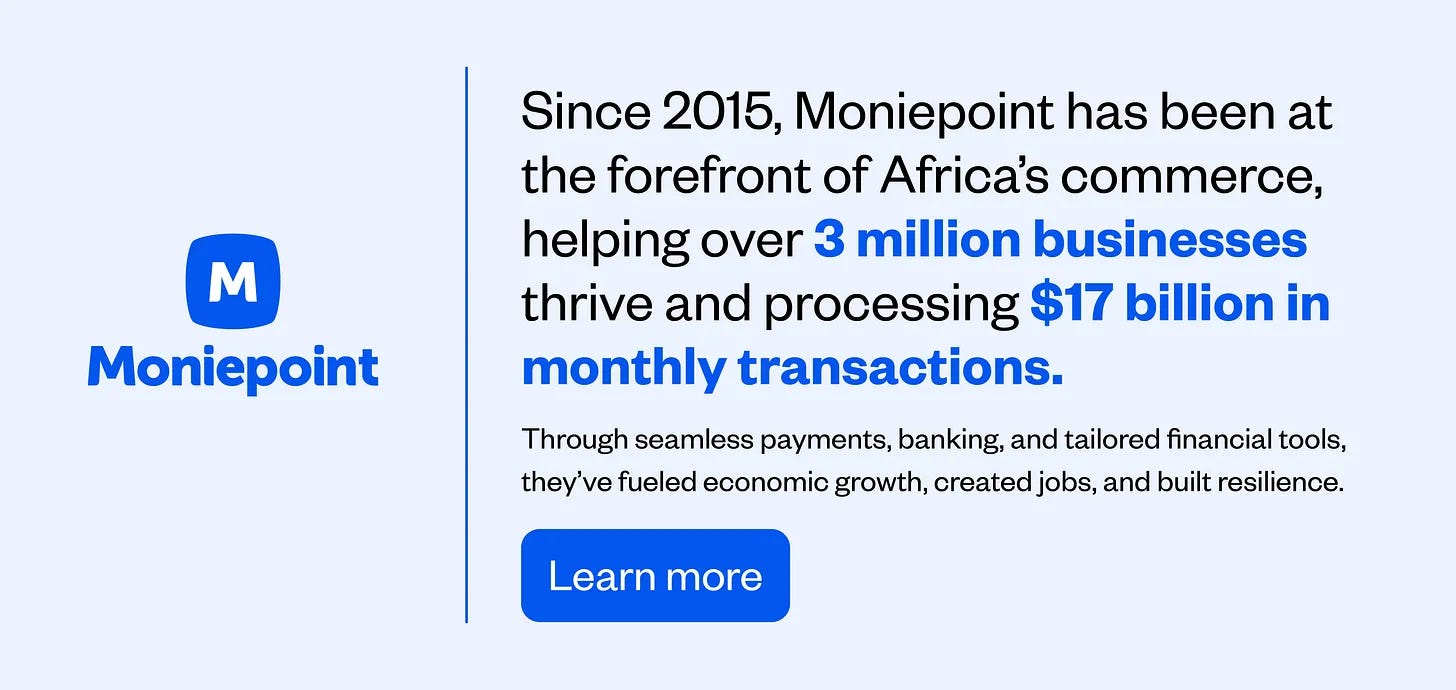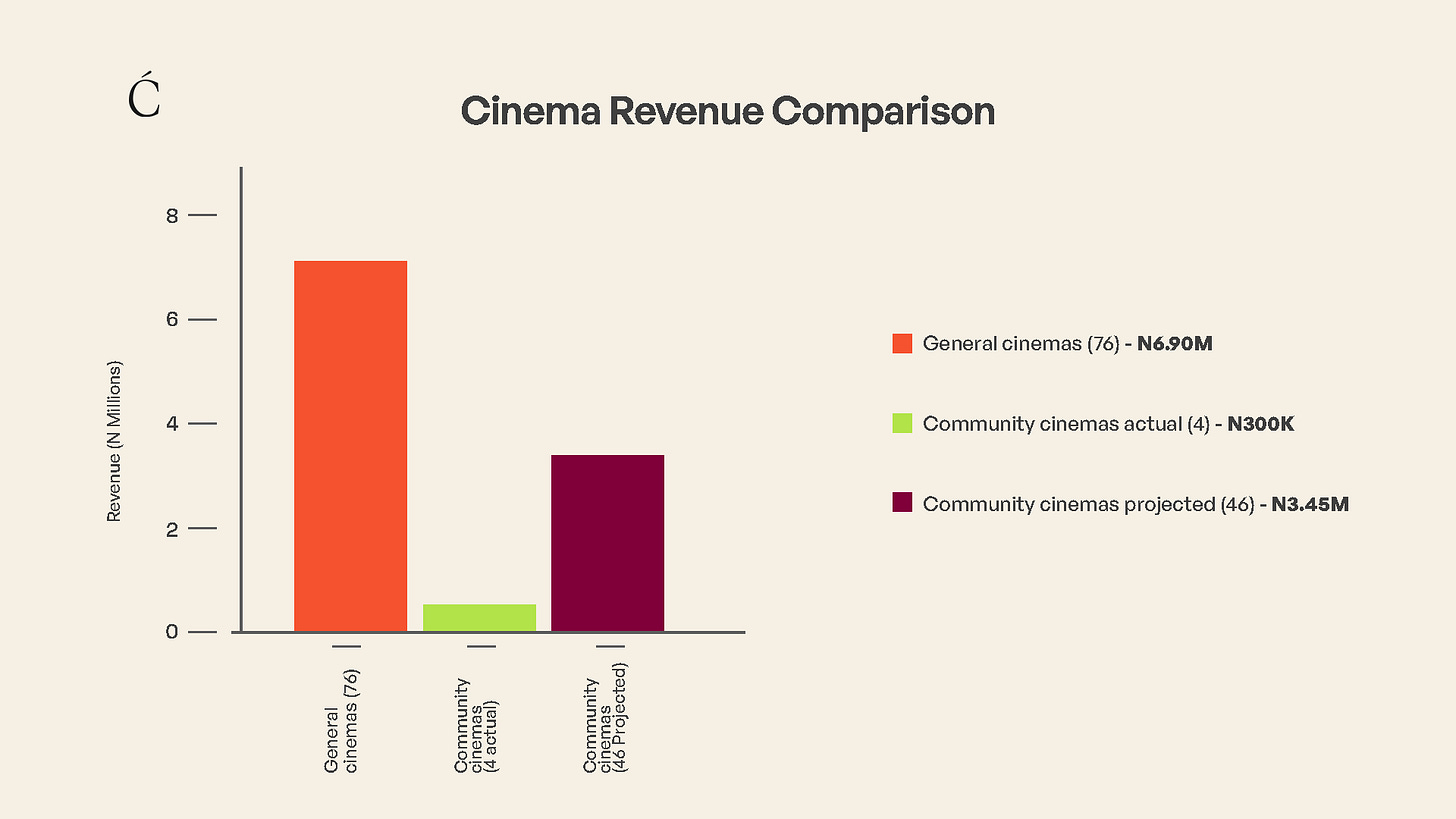Communiqué 86: What went wrong with Fusion Intelligence’s community cinema experiment
Fusion Intelligence’s Red Circle community cinema pilot held a lot of promise, but tactical miscalculations and assumptions threatened its success.
Presented by Moniepoint
Why this matters
1. Even a failed pilot proved Nollywood audiences are hungry for lower-cost, piracy-safe screenings.
2. Use location specific data to guide expansion as success depends on existing consumer habits
3. Innovation fails without seamless delivery; this pilot is a masterclass in fixing the balance between security and user experience.
1. Best laid plans
In Communiqué 80, we explored Fusion Intelligence’s bold plan for a community cinema model that could deliver Nollywood films beyond traditional cinema locations. At the time, we noted that “Fusion Intelligence makes a compelling pitch to both filmmakers and exhibitors: show your film in more places safely, and earn revenue from an entirely new class of venues.”
On August 1, the Lagos-based technology solutions provider put that plan to the test. Partnering with Café One, one of Nigeria’s largest coffeehouse chains, it piloted screenings of filmmaker Nora Awolowo’s Red Circle across four locations — Kaduna, Owerri, Uyo, and Enugu — outside Lagos, Nigeria’s most profitable box office market.
Awolowo, one of Nollywood’s most exciting young directors, had already scored a theatrical hit with Red Circle. The film grossed over ₦100 million during its cinema run earlier in June and earned strong reviews for its storyline and visual style. By selecting a proven box office success for the pilot, Fusion wanted to demonstrate that its community cinema model could deliver the same high-demand content that audiences were paying premium prices to see in traditional cinemas, but at a lower cost and in more accessible spaces.
2. Where things fell apart
Ahead of the screening, Fusion Intelligence had tested Convoy, its distribution platform, with films in the public domain like The Sound of Music. However, they did not test Convoy at the screening locations. The internal tests went smoothly. But there was a catch: The Sound of Music file was just 1.5 gigabytes, while Red Circle was over 7 gigabytes. That difference proved decisive.
On the morning of the screenings, the Red Circle file was uploaded to Convoy to further reduce the chances of the film leaking. But the first sign of trouble came when it took hours for Red Circle to download at the screening locations. In Kaduna, the process dragged on for more than four hours; in Owerri, Enugu, and Uyo, it took over two hours. The delays meant screenings started late.
Then came the bigger problem.
Fusion Intelligence had over-indexed on security with Convoy. The platform allowed producers to upload their films, have them encrypted, and securely stream them to authorised locations with unique decryption keys. On paper, this solved Nollywood’s greatest fear: piracy. But in practice, Convoy’s security system created a broken viewing experience. As Red Circle played, Convoy automatically began re-encrypting played parts in real time to prevent duplication.
The Red Circle file’s large size became a problem. Convoy re-encrypted the file faster than people could watch the movie. Screenings stopped repeatedly, forcing projection teams to re-enter decryption keys multiple times during a single showing.
As a result, the screenings on the first day failed. Fusion Intelligence quickly adjusted, slowing down the encryption speed on the platform. To rebuild goodwill, they offered free screenings of Red Circle throughout August.
3. Lessons and small wins
The pilot wasn’t a total flop. On opening day, 100 tickets were sold across the four locations, generating ₦300,000. This amount may seem modest, but let’s put it into perspective. Red Circle’s opening day in traditional cinemas grossed ₦6.9 million across 76 locations nationwide, with 30 locations in Lagos. Fusion Intelligence generated roughly 4% of that revenue across four community cinema locations, with less than half the cost of regular cinema tickets. When you begin to scale that number up, it begins to make a difference. For instance, if there are community cinemas in each of the 46 locations outside Lagos, they will generate around ₦3.5 million, or 50% of Red Circle’s opening-day gross.
Owerri recorded the highest sales, while Uyo sold the least. The contrast was telling: Owerri already hosts two established cinemas, while Uyo has none (its most prominent cinema, Silverbird, shut down in 2024). The results suggest that community cinema may not necessarily thrive in cities without cinemas, as long assumed, but rather in places where cinema-going culture is already established. In such markets, community cinemas could serve as a lower-cost alternative for audiences priced out of premium cinema experiences.
Marketing also played a role. “We focused our marketing on the first day of the screenings,” Fusion Intelligence CEO Kolade Adewoye told Communiqué. Many viewers assumed the screenings were a one-off event and only bought tickets for the opening day. Following the technical mishaps, all subsequent screenings were free, further limiting revenue.
Still, the experiment validated key parts of Fusion’s thesis. Concessions, such as snacks and drinks sold during screenings, brought in almost the same revenue as tickets, proving that community cinemas could open new income streams for host venues. And perhaps most importantly, Convoy kept the film secure. Despite all the hiccups, Red Circle never leaked online, a significant achievement in an industry long battered by piracy.
Fusion Intelligence’s Red Circle pilot shows both the promise and pitfalls of building a new exhibition model for Nollywood. Piracy protection may matter to producers and investors, but audiences ultimately judge by experience. If the viewing isn’t smooth, the model fails.
Fusion Intelligence now faces the challenge of fine-tuning Convoy to strike the right balance between security and usability. The outcome won’t just shape its own fortunes, but also those of the entire industry.
Fusion Intelligence has released a full breakdown of the Red Circle Pilot. You can read it here.
Thanks for reading Communiqué! Help us give Africa’s creative economy the coverage it deserves by donating here.





